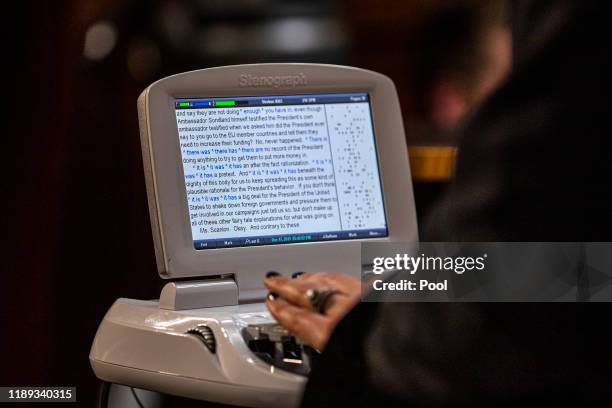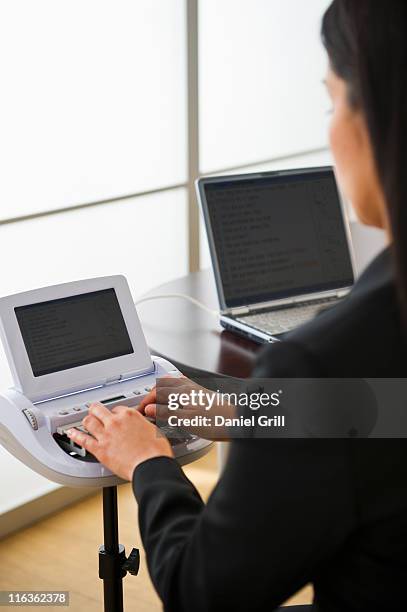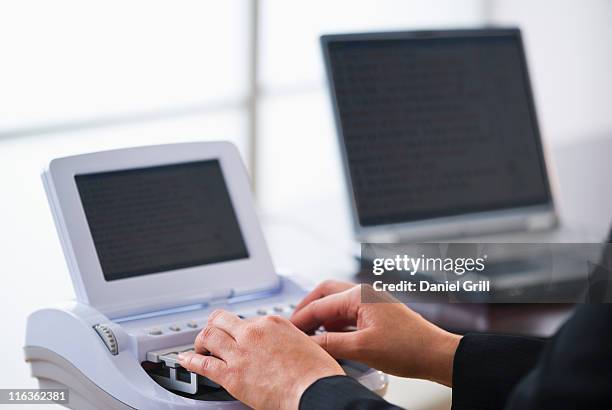Court Typist vs. Stenographer: Exploring the Key Differences
Discover the Necessary Skills and Obligations of a Court Typist in Today's Lawful Landscape
As a court typist, you hold an important position in the lawful system. Your abilities go past just typing; they include understanding complicated lawful terms and procedures while making certain accuracy in every record. You work together very closely with judges and lawyers, making your duty vital for effective interaction. But what certain skills do you need, and just how can you adjust to the ever-evolving technological landscape? Let's explore this better.
The Role of a Court Typist in the Judicial System
As the backbone of the judicial system, a court typist plays an essential function in ensuring that lawful process are precisely recorded. You are accountable for transcribing every little thing from witness testimonies to courts' rulings, recording every information with accuracy. Your job helps maintain a irreversible and clear record of court activities, which is critical for future reference and appeals.In the court, you're commonly the unrecognized hero, quietly guaranteeing that all spoken words become written records. You maintain confidentiality, comprehending the sensitive nature of legal matters. You also work together carefully with lawyers, judges, and clerks to assure the smooth circulation of details. By functioning successfully under stress, you add to the total performance of the judicial procedure. Your interest to information and commitment to accuracy not only promote the honesty of the court yet likewise support the broader pursuit of justice in society.
Important Abilities Needed for Court Typists
Court typists need a special blend of skills to succeed in their crucial duty within the judicial system. You must have superb keying abilities, typically achieving rates of 70 words per minute or even more. Accuracy is crucial; also a minor mistake can result in substantial misconceptions in legal papers. You'll likewise need strong attention to information, guaranteeing every word is recorded correctly.Additionally, good business skills are essential for handling numerous situations and records effectively. Being tech-savvy is essential, as you'll make use of various software application for data processing and record monitoring. Strong interaction abilities assist you connect with judges, legal representatives, and other court employees effectively.Lastly, a sense of professionalism and reliability and privacy is a must, as you'll handle delicate info daily. By honing these skills, you'll be well-prepared to add considerably to the court setting.
Understanding Legal Terms and Treatments
As a court typist, you need to comprehend vital legal terms and procedures to perform your task effectively. Recognizing these concepts not only assists you record accurately but likewise ensures you can adhere to the circulation of court proceedings. Let's check out the important lawful vocabulary and a summary of court processes you must know.

Trick Legal Terms
Understanding essential legal terms is crucial for anyone working in a court atmosphere. You'll regularly run into terms like "complainant," which describes the individual launching a lawsuit, and "offender," who reacts to the claims. Recognizing the distinction between "civil" and "criminal" situations assists you comprehend the context of the procedures. Experience with "subpoena" guarantees you understand the lawful records compelling witnesses to affirm. Furthermore, terms like "evidence" and "statement" are vital, as they relate straight to the info presented in court. Understanding these terms not just improves your efficiency as a court typist however also ensures that you add to the accuracy and clarity of legal records. Your role pivots on accurate terminology, so don't take it gently!
Court Procedures Overview
Knowledge with crucial legal terms establishes the phase for understanding court procedures. Comprehending how a courtroom features is important for any court typist. You'll run into processes like arraignments, where accuseds hear costs, and movements, which are requests for a court ruling. Acquaint yourself with the functions of clerks, courts, and attorneys, as each plays a crucial component in proceedings. Understanding the flow of a trial-- from jury choice to shutting arguments-- assists you precisely catch the process - court typist. Furthermore, understanding the relevance of preserving a objective and exact document can not be overemphasized. By grasping these elements, you'll improve your efficiency in documenting crucial court activities and add substantially to the lawful procedure. Your duty is important in maintaining the honesty of court documents
The Impact of Innovation on Court Typing
Innovation's transformed court typing in significant methods. With digital transcription devices, you can enhance efficiency and accuracy, making your task simpler than ever before. And also, remote court procedures have transformed exactly how you approach your job, requiring versatility to new layouts and modern technologies.
Digital Transcription Tools
As electronic transcription tools continue to evolve, they're transforming the method court typists do their obligations. These devices simplify the transcription process, allowing you to catch spoken words properly and efficiently. With voice acknowledgment software application, you can record real-time proceedings, decreasing hands-on input and reducing errors.Moreover, cloud-based platforms allow easy access to files, so you can work collaboratively with legal groups and guarantee everybody's on the very same page. Automated format features conserve you time on recurring tasks, allowing you concentrate on web content quality.Additionally, electronic tools enhance safety and security, safeguarding sensitive details via encrypted storage space and controlled access. By embracing these modern technologies, you can boost look at these guys your efficiency and preserve the high requirements required in description the legal area.
Remote Court Process
The increase of remote court procedures has actually significantly changed the landscape for court typists. You now count on technology to catch and record online hearings from your office or home. Knowledge with video conferencing systems is essential, as you'll need to browse them flawlessly to ensure an accurate record. You'll likewise need to handle audio top quality, as background noise or connection problems can interrupt your work. Furthermore, remote procedures demand fast reasoning; you might require to clarify declarations or request repeats in real-time. Staying organized and reliable is vital, as due dates stay tight. Welcoming these technical advancements not just improves your skills but also guarantees you continue to be a vital possession in today's developing legal environment.
Accuracy and Interest to Detail in Transcription
Accuracy and focus to information are crucial in transcription, especially for court typists. court typist. Every word matters when you're recording legal procedures. A solitary blunder can change the significance of a statement, possibly affecting the outcome of a case. You should listen very carefully, ensuring that you catch every nuance and inflection in the speaker's voice.Your capacity to catch typos and grammatical mistakes is essential. You do not just kind; you verify that the last document is an accurate depiction of what was claimed in court. This requires an eager eye and a comprehensive understanding of lawful terminology.Moreover, you'll need to be knowledgeable about different accents and speaking designs, as courtrooms can organize a variety of audio speakers. By honing your precision and attention to detail, you'll maintain the stability of lawful records and contribute noticeably to the judicial process. Your diligence in this area absolutely makes a distinction

Time Monitoring and Business Skills
While taking care of multiple jobs, effective time management and business abilities are vital for court typists. You'll usually manage different target dates, from recording court process to preparing lawful records. Prioritizing your workload is essential; recognize urgent tasks and tackle them initially to ensure prompt submissions.Organizational abilities come right into play when you're sorting through situation notes, records, and data. Keeping every little thing nicely categorized not just this link conserves time however additionally reduces the danger of error. Using devices like schedules, to-do lists, or specialized software can aid you stay on track and handle your time effectively.Moreover, setting certain goals for each and every job session can enhance your performance. Break bigger tasks into smaller tasks to make them more convenient. By sharpening these abilities, you'll not just boost your effectiveness but likewise add considerably to the smooth operation of the legal procedure, ensuring every little thing runs like clockwork.
Continuing Education And Learning and Professional Advancement Opportunities
Buying your skills does not stop with time monitoring and company. As a court typist, you'll locate that proceeding education and learning and specialist development are vital to remaining affordable in the legal field. Search for workshops or on the internet courses concentrating on advanced keying methods, legal terms, and transcription software program. These can hone your skills and help you adapt to the most recent technologies.Networking is similarly important. Join expert companies like the National Court Reporters Association (NCRA) or regional lawful organizations. They usually offer sources, training sessions, and meetings that can improve your understanding and link you with peers.Don' t forget qualification programs that can enhance your integrity and bankability. Staying upgraded with the most current trends and best practices in legal paperwork will certainly enhance your effectiveness and accuracy, making you a vital asset to any type of lawful team. Buy your development, and you'll gain the rewards throughout your occupation.
Frequently Asked Inquiries
What Is the Typical Salary Range for a Court Typist?
A court typist's typical income arrays from $30,000 to $55,000 yearly, depending on experience and location. You could also locate chances for growth with extra skills, leading to boosted pay in the legal area.

Are Court Typists Required to Have a Lawful Degree?
Court typists do not require a lawful degree, but having one can be valuable. You'll typically locate that strong keying abilities and understanding of lawful terms are more crucial for success in this function.
What Are the Job Hours for a Court Typist?

Exactly How Do Court Typists Ensure Privacy in Their Job?
You assure privacy by safely managing sensitive files, utilizing encrypted software application, and complying with rigorous methods. You remain familiar with personal privacy legislations and only share details with licensed workers, preserving count on the judicial procedure.
Can Court Typists Job From Another Location or Freelance?
Yes, you can work remotely or freelance as a court typist, specifically if you have reputable innovation and a protected atmosphere. Many lawyers currently embrace remote work, supplying adaptability and possibilities for independent typists. As the foundation of the judicial system, a court typist plays a vital function in ensuring that legal process are properly recorded. As a court typist, you need to grasp vital lawful terms and procedures to do your job effectively. Grasping these terms not just improves your efficiency as a court typist yet likewise ensures that you add to the precision and clarity of lawful files. The surge of remote court process has actually substantially altered the landscape for court typists. As a court typist, you'll find that proceeding education and professional growth are necessary to staying affordable in the legal field.